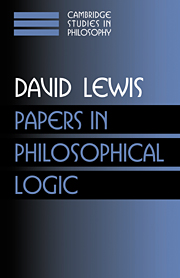Book contents
- Frontmatter
- Contents
- Dedication
- Introduction
- 1 Adverbs of quantification
- 2 Index, context, and content
- 3 ‘Whether’ report
- 4 Probabilities of conditionals and conditional probabilities II
- 5 Intensional logics without iterative axioms
- 6 Ordering semantics and premise semantics for counterfactuals
- 7 Logic for equivocators
- 8 Relevant implication
- 9 Statements partly about observation
- 10 Ayer's first empiricist criterion of meaning: why does it fail?
- 11 Analog and digital
- 12 Lucas against mechanism
- 13 Lucas against mechanism II
- 14 Policing the Aufbau
- 15 Finitude and infinitude in the atomic calculus of individuals (with Wilfrid Hodges)
- 16 Nominalistic set theory
- 17 Mathematics is megethology
- Index
16 - Nominalistic set theory
Published online by Cambridge University Press: 05 June 2012
- Frontmatter
- Contents
- Dedication
- Introduction
- 1 Adverbs of quantification
- 2 Index, context, and content
- 3 ‘Whether’ report
- 4 Probabilities of conditionals and conditional probabilities II
- 5 Intensional logics without iterative axioms
- 6 Ordering semantics and premise semantics for counterfactuals
- 7 Logic for equivocators
- 8 Relevant implication
- 9 Statements partly about observation
- 10 Ayer's first empiricist criterion of meaning: why does it fail?
- 11 Analog and digital
- 12 Lucas against mechanism
- 13 Lucas against mechanism II
- 14 Policing the Aufbau
- 15 Finitude and infinitude in the atomic calculus of individuals (with Wilfrid Hodges)
- 16 Nominalistic set theory
- 17 Mathematics is megethology
- Index
Summary
INTRODUCTION
By means that meet the standards of nominalism set by Nelson Goodman (in [1], section II, 3; and in [2]) we can define relations that behave in many ways like the membership relation of set theory. Though the agreement is imperfect, these pseudo-membership relations seem much closer to membership than to its usual nominalistic counterpart, the part-whole relation. Someone impressed by the diversity of set theories might regard the theories of these relations as peculiar set theories; someone more impressed by the non-diversity of the more successful set theories – ZF and its relatives – might prefer not to. This verbal dispute does not matter; what matters is that the gap between nominalistic and set-theoretic methods of construction is narrower than it seems.
PRELIMINARIES
A finitistic nominalist's world might consist of an enormous hypercubical array of space-time points, together with all wholes composed of one or more of those points. Each point in the array is next to certain others; nextness is a symmetric, irreflexive, intransitive relation among the points. We can (but the nominalist cannot) describe the array of points and the nextness relation more precisely by stipulating that the points can be placed in one-to-one correspondence with all the quadruples 〈x, y, z, t〉 of non-negative integers less than or equal to some very large integers xmax, ymax, zmax, tmax, respectively in such a way that one point is next to another iff the corresponding quadruples are alike in three coordinates and differ by exactly one in the remaining coordinate.
- Type
- Chapter
- Information
- Papers in Philosophical Logic , pp. 186 - 202Publisher: Cambridge University PressPrint publication year: 1997



